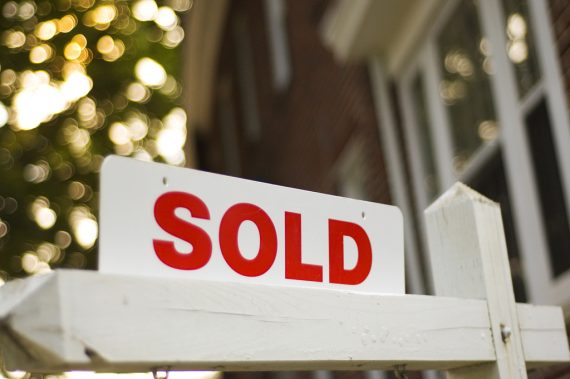Homebuyer Tax Credits: The Return Of A Really Bad Idea
After several months of bad housing sales, politicians in Washington are starting to talk about bringing back one of the worst public policy programs of the last two years.
The head of the Department of Housing And Urban Development said today that there is no final decision on bringing back the so-called Homebuyer Tax Credit:
The Obama administration has not decided whether it should resurrect a popular tax credit for first-time homebuyers, U.S. Housing and Urban Development Secretary Shaun Donovan said on Sunday.
“It’s too early to say whether the tax credit will be revived,” Donovan said in an interview on CNN’s “State of the Union” program. He said the administration would “do everything we can” to stabilize the shaky U.S. housing market.
A federal $8,000 homebuyer tax credit, which expired several months ago, had boosted home sales, helping to revive a flagging housing market that had been a key factor in driving the United States into recession.
It followed a $6,500 credit for those purchasing a new primary residence, which also has expired.
But an unexpectedly large drop in U.S. home sales in July — sales of existing homes in the period fell to their slowest pace in 15 years — has spurred fears that the nation could be on the cusp of another sharp drop in housing.
Of course, what the housing figures that have come out in the months since the HBTC expired establish quite clearly is that the tax credit did absolutely nothing to “stimulate” the economy. Instead, all that happened was that the tax credit caused people who were already in the market to some degree to time shift their purchase decisions so that they could take advantage of the tax credit. There’s absolutely no evidence that it “stimulated” the housing market, just as there’s absolutely no evidence that the “Cash for Clunkers” program stimulated the market for new automobiles.
Since the tax credit merely made it an incentive for people to buy sooner rather than later, it actually ended up being a gift of “free money” to people who didn’t really need the incentive of a tax credit to decide to buy a home:
The tax credit is very poorly targeted. Approximately 1.9 million buyers are expected to receive the credit, but more than 85 percent of these would have bought a home without the credit. This suggests a price tax of about $15 billion – which is twice what Congress intended – for approximately 350,000 additional home sales. At $43,000 per new home sale, this is a very expensive subsidy.
It’s even worse in that most of the new home sales just result in moving renters to owners, which does not absorb the excess supply of houses. The core of our weak housing market is that the housing bubble led to too many homes being built, and the recession has led to a decline in household formation. By moving renters into owners, the tax credit does not address either of these causes.
An extension and expansion of the tax credit will cost far more than the $15 billion of the current credit, likely in excess of an additional $30 billion. And the cost per new house sale will likely be much higher going forward, as a greater proportion of the sales will be for those who would have bought anyway, without the credit.
Finally, there are two larger points we should not lose sight of. First, tax expenditures are not a free lunch. The billions of dollars spent on the tax credit will ultimately have to be paid back through higher, economically distorting, taxes. And while a tax credit is unlikely to be the straw that breaks the camel’s back, our growing debt burden is something to fear. Second, government policies to promote homeownership (or, more accurately, home-borrowership) were partial contributors to our housing and credit market problems. Ultimately, we need to decrease the government’s housing incentives, including the mortgage finance subsidies, the mortgage interest deduction, and the favorable capital gains treatment for housing. A good place to start this weaning would be by not extending or expanding the home-buyer tax credit.
That was from a Brookings Institution report on the original homebuyer tax credit, Congress didn’t listen then, but it would do well to listen now, especially since the entire idea of using the tax code to subsidize middle-class homeownership is one that probably needs to be re-examined anyway:
How about this — an end to federal subsidies for home ownership. Market actors have overinvested in housing. The macroeconomy will not recover until that money is transferred out of housing and into other, more productive economic sectors. Plans to retard that necessary shift in investment will slow economic recovery and produce a less efficient economy as a consequence.
I know that there is plenty of political capital to be gained by providing handouts to middle-class homeowners and little political capital in removing the same. But a political party that ostensibly stands for free markets and limited government should not be in the business of underwriting or subsidizing private investments in anything unless we can find some plausible market failure in need of correction (and perhaps not even then).
Hence, the necessary question: Is there any market failure that would result in sub-optimal investment in private housing? Not that I am aware of.
In this case, we’re not dealing with a market failure, we are dealing, as I noted earlier today, with a market that is still trying to correct itself after a decade or more of irrational exuberance. The only responsible thing for government to do in that situation is to let the market work itself out rather than trying to reinflate a housing bubble that never should have existed in the first place.







Slight nitpick, but
<blockquote> First, tax expenditures are not a free lunch. The billions of dollars spent on the tax credit will ultimately have to be paid back through higher, economically distorting, taxes.</blockquote>
This seems to be making the assumption that there is a finite amount of money raised at a certain tax level, so that if we borrow and spend, we’ll have to raise taxes to pay it back.
That’s not necessarily the case, though. Tax revenues tend to go up and down at the same tax level, depending on the economy, and a period of solid growth can wipe out deficits without massive rises in taxation (witness how the US got rid of much of its World War 2 debt, which was at 127% of US GDP in 1945).
Argggh! I did it again, screwing up the quotes.
Slight nitpick, but
This seems to be making the assumption that there is a finite amount of money raised at a certain tax level, so that if we borrow and spend, we’ll have to raise taxes to pay it back.
That’s not necessarily the case, though. Tax revenues tend to go up and down at the same tax level, depending on the economy, and a period of solid growth can wipe out deficits without massive rises in taxation (witness how the US got rid of much of its World War 2 debt, which was at 127% of US GDP in 1945).
“Of course, what the housing figures that have come out in the months since the HBTC expired establish quite clearly is that the tax credit did absolutely nothing to “stimulate” the economy.”
And if they hadn’t bought those houses in that time period would the housing market and thus the broader economy have been stronger or weaker Doug?
Joe, how do you define stimulus? Is it a one time gift or an investment which grows with the right fertilizer? Which will take root better?
We bought a home with the tax credit earlier in the year & put 4oK into it before we moved in. I kinda think keeping our contractor working and making all those trips to Home Depot helped the economy.
Everyone but the most juvenile Libertarians agree government intervention is warranted when markets fail.
How do you tell the difference between a market correction and a market failure?
It would be nice to phase out all forms of government home-buying subsidies. But for that, people would need to understand that home-buying isn’t good for everyone. Many would be better off with good quality and low cost rentals. They’d be less cash(flow) strapped, and more mobile, ready to follow jobs.
It would be “moderate” to phase such things out over 10 years, but I doubt we’ll get even that. Home-buying is “a chicken in every pot” for today’s politicians.
(Specifically on the home-buying tax credits, I think they were a bad idea, but perhaps not horribly bad. It’s possible that a panic slowed really does become less of a total panic – measured from top to bottom. We’ll never know for sure, but it seems the psychology could work that way. When prices find their bottom, even if it is a year from now, it may be at a higher level than it might have been.)
Pete says:
Sunday, August 29, 2010 at 13:09 ”
“Joe, how do you define stimulus?”
Is there more or less economic activity as a result a certain set of actions. Obviously this tax credit because it stimulated house purchases produced greater economic activity. And Mataconis has no hard evidence for his claim that these purchases would all have happened anyway without an incentive. Some of them might have done at some finite period in the future but maybe they pushed many people over the edge who would have opted to stay as renters since the size of the credit suggests this was very much a program aimed at the bottom and middle of the market. At the moment the housing market, which is a prime economic driver, is in intensive care so anything that can be done to to revive it is desirable. Nor was there anything wrong with the cash for clunkers program. The auto industry needed help THEN not in the long run by which time, as Keynes pointed out, we’ll be dead. And I note that Doug didn’t answer my question!
Anjin, if you had 40k you should not have gotten a tax credit. Ponce you know why the market failed. Hint, Fanny Mae and Freddy Mac. With a sprinkling of help from Frank and Dodd. Look up the CRA. When banks are encouraged, browbeaten or threatened into making loans to people who cannot possibly pay them back, ad this to a market place where demand is greater than supply. What you get is an inflated market where people who could under normal situations afford to buy a house, found themselves owning more than they could pay. Thanks to government intervention the balloon grew. Finally, someone wanted to get paid.l Pop goes the balloon. Democrats started it, Democrats nurtured it, Democrats protected it. When it blew up in their faces, they blamed Bush. Americans know the truth, inspite of the lies of the left and we are very very tired of it.
“Ponce you know why the market failed. Hint, Fanny Mae and Freddy Mac.”
Since until mid 2007 which was about 9-12 months after the housing bubble started to pop, F/F never took more than about 20-25% of the secondary mortgage market, the vast bulk of it was sold into the private sector, how can this be I wonder? Not that I’m going to get any explanation let alone a coherent one.
“Ponce you know why the market failed. Hint, Fanny Mae and Freddy Mac.”
Zels,
Wingnuts blaming the recession on a few dusky citizens getting loans certainly is novel but not very helpful for the real world.
No responsible government is going to “let the market work itself out.” There was irrational exuberance alright, but to the extent that it came from first-time homebuyers with government help and sweet deals from Fanny or Freddie, as opposed to house-flippers and wannabe Tom Vu types, changes things a little. The biggest downside to homebuyer credits and tax deductions is the lost tax revenue to the state.
And for that I shed a tear.